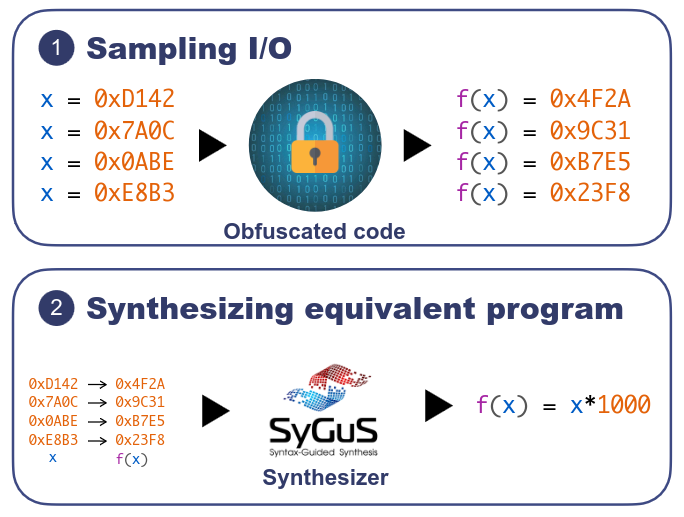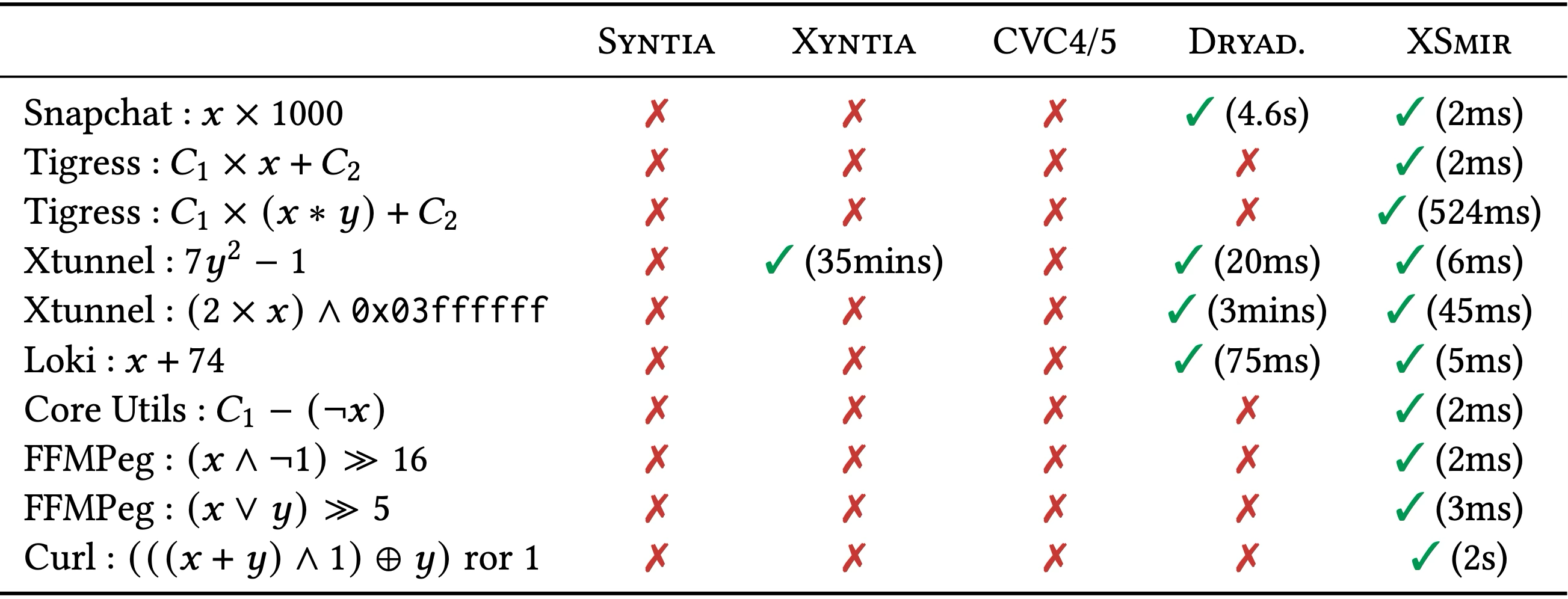General topic
Reverse engineering, Deobfuscation, Artificial intelligence, Program synthesis
Context
Obfuscation is a family of methods that take a program and translate it into a new program, harder to analyze and understand. While obfuscation can be used to protect intellectual property. It is also used by malware authors to impede detection and slow down remediation.
Hence, multiple automated deobfuscation methods have been proposed to simplify obfuscated software. Especially, black-box deobfuscation relies on program synthesis to recover a simple version of a code. It first sample the obfuscated code snippet, generating inputs randomly and monitoring its outputs. Then, with its input-output observations, black-box deobfuscation synthesizes a code that mimics the obfuscated code but which is simpler to understand. As black-box deobfuscation relies only on input-output observations, it is totaly immune to standard deobfuscation. Still, it is limited by the synthesis capabilities of current program synthesizers.

Goal: This paper aims to improve program synthesis capabilities to better handle deobfuscation tasks. To to so, we propose Search Modulo Inference Rules (SMIR) that combines search and deduction the recover usually hard to synthesize expressions.
Motivation
Consider the following code snippet, extracted from Snapchat. As you may have guessed, this expression is obfuscated and so is very hard to understand. Unfortunately, the state-of-the-art of black-box deobfuscation cannot recover it, even in 1h.
add x0,sp,#0x1b8 ;struct timeval *tval
mov x1,#0x0 ;struct timezonze *tzone
adrp x8,0x109499000
ldr x8,[x8, #0x1d0]
blr x8 ;gettimeofday(tval,tzone)
ldr x8,[sp, #0x1b8] ;tval->tv_sec
mov x9,#0x3e8
mul x8,x8,x9
ldrsw x9,[sp, #0x1c0] ;tval->tv_usec
lsr x9,x9,#0x3
mov x10,#0xf7cf
movk x10,#0xe353, LSL #16
movk x10,#0x9ba5, LSL #32
movk x10,#0x20c4, LSL #48
umulh x9,x9,x10
mov x10,#0xe6b3
movk x10,#0x7dba, LSL #16
movk x10,#0xecfa, LSL #32
movk x10,#0xd0e1, LSL #48
add x9,x10,x9, LSR #0x4
orr x11,x9,x8
lsl x11,x11,#0x1
eor x8,x9,x8
sub x8,x11,x8
eor x9,x8,x10
mov x10,#0xe6b3
movk x10,#0x7dba, LSL #16
movk x10,#0xecfa, LSL #32
movk x10,#0x50e1, LSL #48
bic x8,x10,x8
sub x8,x9,x8, LSL #0x1
Indeed, the underlying expression computes TVSEC = TVSEC * 1000. This expression is hard to synthesize because
current synthesizers cannot generate efficiently the 1000 constant value.
They must re-create it using the 1 term, generating huge expressions like (1 + 1) << 1 + ... + 1.
SMIR comes to the rescue: Over this example, XSmir (our extension of Xyntia with SMIR) can recover the expression in 2ms. Such good results generalizes to new other class of hard-to-sythesize expressions as shown in the following table:

Major Contributions
In summary, this paper makes the following major contributions:
-
We propose Search Modulo Inference Rules (Smir), a new program synthesis scheme that extends search with inference rules to generate usually hard-to-synthesize expressions. Inference rules serve two roles: they directly extend some candidate solutions into definitive solutions if possible, otherwise they direct the search toward such candidate solutions;
-
We implement Smir on top of the Xyntia deobfuscator with the inference rules to handle usual operations over bitvectors (offsets, masks, affine and polynomial expressions, etc.). It yields XSmir, the first search-based synthesizer handling these cases efficiently;
-
We evaluate XSmir against the state-of-the-art black-box deobfuscators Syntia and Xyntia, as well as the program synthesizers CVC4/5 and DryadSynth, showing that it outperforms them on both real obfuscated and non-obfuscated code. We also compared XSmir against the state-of-the-art white-box deobfuscators ProMBA and Gamba on MBA expressions. Results show that XSmir always successfully simplifies more expressions than them.
Further information
- Read the paper
- To appear at the ACM Conference on Computer and Communications Security (CCS) 2025
- Try Xyntia and get our artifacts